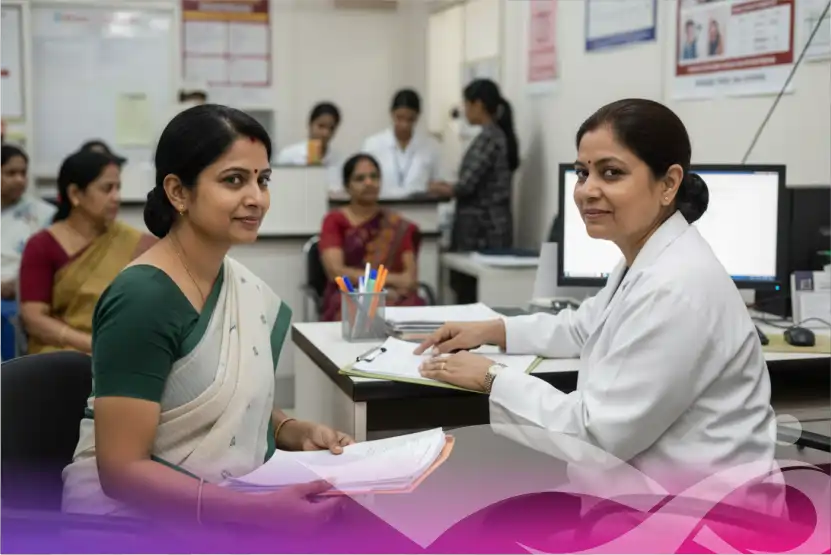Cancer is a complex disease, not a single entity, characterized by the uncontrolled growth and spread of abnormal cells. Understanding what causes cancer in the human body and how cancer spreads to other organs is fundamental to both prevention and effective treatment strategies. The International Oncology Cancer Institute (IOCI) is dedicated to helping our patients and the general public understand these complicated biological processes.
What Causes Cancer?
Cancer is a genetic disease at its core, which means that changes (mutations) in a cell's DNA cause it to grow. Our DNA has genes that tell cells how to divide, grow, and die. Changes in these genes can cause cells to act in strange ways. In general, mutations in three main types of genes can lead to cancer:
1. Proto-oncogenes: These genes usually help cells divide and grow. When they change, they become oncogenes, which act like an accelerator that is stuck in the "on" position and cause cells to divide without stopping.
2. Tumour suppressor genes usually control how cells divide, fix mistakes in DNA, and tell cells when to die. If these genes are changed, cells can grow out of control, just like when the brakes stop working.
3. These genes fix mistakes in a cell's DNA. Because of these changes, other mistakes don't get fixed, which can lead to a lot of mutations that can cause cancer.
There are many reasons why these gene mutations happen:
- Mutations passed down from parents: 5–10% of cancer cases are caused by mutations passed down from parents. This is why some families have more cases of certain types of cancer than others.
- Mutations that happen after birth: Most gene mutations happen after birth. These could be caused by:
Obesity, a bad diet, too much alcohol, smoking, and not getting enough exercise are all major lifestyle factors that can lead to this.
- Environmental exposures: Carcinogens include things like air pollution, asbestos, and some chemicals.
- Radiation: Being around ionizing radiation or ultraviolet (UV) radiation from tanning beds and the sun.
- Infections: Some bacteria (like Helicobacter pylori) and viruses (like HPV, hepatitis B and C, and Epstein-Barr virus) can make it more likely that you will get cancer.
- Random errors: Mutations may not always be found by the body's repair systems. This can also happen by chance during normal cell division.
A normal cell can turn into cancer when a number of gene mutations build up over time.
How Cancer Spreads to Other Parts of the Body
One of the most dangerous things about cancer is that it can spread from where it started to other parts of the body. The new tumours are still made up of cells from the original cancer, and they are called metastases or secondary cancers. For example, lung cancer that spreads to the brain is still called metastatic lung cancer instead of brain cancer.
The "metastatic cascade" is a series of steps that cancer cells go through to spread:
1. Local Invasion: Cancer cells first spread by breaking through the normal tissue boundaries and invading nearby healthy tissues. They could make enzymes that break down healthy tissues and cells around them.
2. Intravasation: Small groups of cancer cells or single cells break away from the main tumour and move into nearby blood or lymphatic vessels.
3. Circulation: The lymphatic or circulatory systems carry these circulating tumour cells (CTCs) to other parts of the body. Most CTCs don't make it, and the trip is often hard.
4. Extravasation: The remaining CTCs stop in small blood vessels far away, break through the walls of the vessels, and spread into the healthy tissue around them.
5. Colonization (Secondary Tumour Formation): After the cancer cells get into the new tissue, they have to adapt to their new environment, avoid the immune system, and begin to multiply and divide to form a new tumour (a metastasis). They also encourage angiogenesis, which is the growth of new blood vessels, so that they can get food.
The main ways that it spreads are:
- Lymphatic System: Once cancer cells get into lymphatic vessels, they can move to nearby lymph nodes, nodes that are farther away, or the bloodstream. This is a common early pathway for a lot of solid tumours.
- Bloodstream (Hematogenous Spread): Cancer cells get into blood vessels directly and travel to other organs through the circulatory system. Metastases often happen in the brain, liver, lungs, and bones because they have a lot of blood flow that cancer cells can "stick" to.
- Direct Extension: The cancer moves directly to nearby organs or tissues.
- Transcoelomic Spread: In some cancers of the abdomen or pelvis, cells may break away from the main tumour and move to other body cavities, like the peritoneal cavity, where they can implant.
Understanding these mechanisms is vital. While we cannot control all risk factors, proactive measures like healthy lifestyle choices, avoiding carcinogens, and undergoing regular cancer screenings for early detection can significantly reduce cancer risk and improve outcomes by catching the disease before it has a chance to spread extensively. At IOCI, our comprehensive approach to cancer care includes not only advanced treatments but also education on prevention and early diagnosis, emphasizing that knowing what causes cancer in the human body and how it spreads is the first step towards better health. That's why IOCI's comprehensive approach to cancer care includes not only cutting-edge treatments but also education on how to avoid getting cancer and how to catch it early.
Consult us at any of our locations—across IOCI Noida, Greater Noida, Mumbai, Indore, Aurangabad, Agartala, Saharanpur, Kanpur and Jodhpur.












